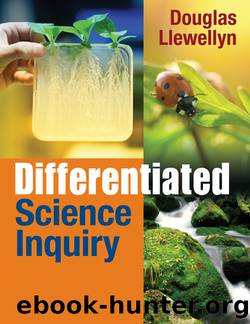Differentiated Science Inquiry by Llewellyn Douglas J.;

Author:Llewellyn, Douglas J.;
Language: eng
Format: epub
Publisher: Corwin Press
Published: 2011-11-05T00:00:00+00:00
Earlier in this chapter, you read how having a choice about the food we eat, the clothes we wear, or the music we listen to is a valued aspect of our culture. But for most adolescents and children, their choices are too often limited to beyond the classroom walls. The challenge to educators becomes the task of building empowerment and ownership within the school's instructional program.
THE CASE OF MR. MERRILL
In this case study (adapted from Deci & Flaste, 1995), Mr. Merrill, a seventh-grade science teacher at Red Wing Middle School, conducted action research in his own classroom as part of completing a master's degree in science education. Mr. Merrill wanted to determine under what circumstances his students may or may not want to make their own choices from one task to another. He furthermore wanted to know how he could encourage more autonomy and decision making in his science classes. He focused his study on his first two periods of Science 7. During Period 1, he had students work on measuring the dimensions of various wooden blocks over the course of several days. With Period 1 students, he was very directive and authoritarian, providing positive oral feedback for the number of objects correctly measured. With Period 2 students (who were similar to those in Period 1), he was less directive and more supportive. He provided nonjudgmental feedback as to the quality of the completion of objects correctly measured. At the end of the wooden block activity, he told both groups that they had an additional group of objects to measure. Mr. Merrill told the classes that they could either choose which objects they would like to measure or he could choose for them. The results indicated that Period 1 students, who experienced a more teacher-directed situation, overwhelmingly asked Mr. Merrill to select the objects, whereas the Period 2 students, who operated in a more autonomous situation, wanted to choose the objects for themselves.
Mr. Merrill concluded that one benefit of offering meaningful choice is that it engenders empowerment. Choice encouraged these middle school students to fully sanction what they were doing and allowed them to feel a greater sense of resolve. In his summary, he stated that he believed that all the students benefited from the measuring activity; however, the Period 1 students appeared dependent on the teacher, whereas the Period 2 students felt greater confidence in their measuring abilities as well their decision-making skills.
He also concluded that the goal of creating intrinsically motivated students seems best achieved when he was intrinsically motivated. When he is self-directed, trying new instructional methods, and demonstrating self-efficacy, he is more supportive of studentsâ attempts at self-determination. Merrill's suggestion is supported by the work ofAshton (1990), who asserts that teacher efficacy has a consistent relationship to student achievement. In other words, when the teacher feels empowered, so do the children in the class.
Download
This site does not store any files on its server. We only index and link to content provided by other sites. Please contact the content providers to delete copyright contents if any and email us, we'll remove relevant links or contents immediately.
| Arts & Humanities | Health |
| Language Arts | Library Skills |
| Mathematics | Reading & Phonics |
| Science & Technology | Social Studies |
The Art of Coaching Workbook by Elena Aguilar(51198)
Trainspotting by Irvine Welsh(21665)
Twilight of the Idols With the Antichrist and Ecce Homo by Friedrich Nietzsche(18632)
Fangirl by Rainbow Rowell(9250)
Periodization Training for Sports by Tudor Bompa(8272)
Change Your Questions, Change Your Life by Marilee Adams(7781)
This Is How You Lose Her by Junot Diaz(6887)
Asking the Right Questions: A Guide to Critical Thinking by M. Neil Browne & Stuart M. Keeley(5775)
Grit by Angela Duckworth(5614)
Red Sparrow by Jason Matthews(5472)
Paper Towns by Green John(5191)
Room 212 by Kate Stewart(5121)
Ken Follett - World without end by Ken Follett(4731)
Housekeeping by Marilynne Robinson(4447)
The Sports Rules Book by Human Kinetics(4386)
Papillon (English) by Henri Charrière(4274)
Double Down (Diary of a Wimpy Kid Book 11) by Jeff Kinney(4272)
The Motorcycle Diaries by Ernesto Che Guevara(4101)
Exercise Technique Manual for Resistance Training by National Strength & Conditioning Association(4071)
